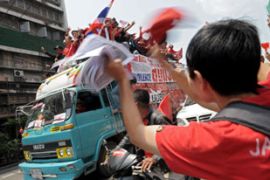Thai red shirts seek to woo Bangkok
Convoy of anti-government protesters tries to gain support of the capital’s residents

Abhisit came to power, with army backing, through a December 2008 parliamentary vote after a controversial court ruling removed allies of Thaksin Shinawatra, the ousted former premier.
The protesters have demanded that he dissolve parliament and call fresh elections – a demand he has repeatedly rejected.
Traffic congestion
The red shirts – formally known as the United Front for Democracy against Dictatorship – are supporters of Thaksin, who has been in exile since being forced from power in 2006.
| in depth | |||||||||
|
On Friday before the march, Thaksin addressed his supporters via a video link-up, saying: “Fellow Bangkokians, send any kind of signals, wave a red flag, give some water, so that our red shirts can feel at ease.
“I apologise for the traffic congestion lately and there will be more traffic jams when we march.
“When I return, [I promise] 10 lines of electric trains from Bangkok to the surrounding provinces.”
City and police officials had urged residents to use public transport and either stay at home or at their workplaces until the demonstration ended.
Protesters said that Bangkok residents had turned out to support their action.
“I haven’t seen any opposition from Bangkok people. People were thankful,” Kotchawan Pim-ngern, one of the red shirts travelling on a pickup truck, told The Associated Press news agency.
“They came to cheer us from all walks of life. They gave water and food to us. Just seeing them come out made me happy,” she said.
“They all want democracy back.”
Thaksin ‘stigma’
Police estimated that 65,000 protesters took part in the procession, although some media and witnesses said as many as 90,000 people were in the convoy.
A 50,000-strong security force has been in place in Bangkok and the surrounding areas throughout this week as the red shirts have held a series of dramatic protests.
| Thailand’s Red Shirts |
|
|
Pitch Pongsawat, a political scientist at Chulalongkorn University, said that many Bangkok residents sympathised with the movement, but did not support Thaksin, who has been convicted of abuse of power and corruption while in exile.
“These people are ambivalent because of the stigma of Thaksin,” he said.
“The Thai media is their obstacle, it portrays the ‘red shirts’ as blind followers of Thaksin, which means if you join them, you approve of Thaksin.”
On Sunday, the red shirts plan to follow the march by producing a giant paiting from their own blood.
“Artists and red shirts will be invited to partake in a blood painting,” Jatuporn Prompan, a protest leader, said.
They plan to unfurl a giant white cloth on which supporters will be invited to paint pictures, scrawl poems and express political statements.
“The theme of this artwork will be the history of the people’s fight for democracy,” Jatuporn said.
Earlier this week, the blood of protesters was splattered at Abhisit’s office, at the headquarters of his ruling party and at his private residence.
Abhisit has said he was willing to hold talks with the protesters to end the deadlock, but only if Thaksin was off the agenda.
“My question is: What is the standpoint of the ‘red shirts’? Democracy or Thaksin? If answer is democracy, we can talk,” he told Channel 3 television.
The protesters have said that they will talk, but only to Abhisit not other members of his government.

 Supporters of former PM Thaksin Shinawatra, ousted in bloodless coup in 2006
Supporters of former PM Thaksin Shinawatra, ousted in bloodless coup in 2006